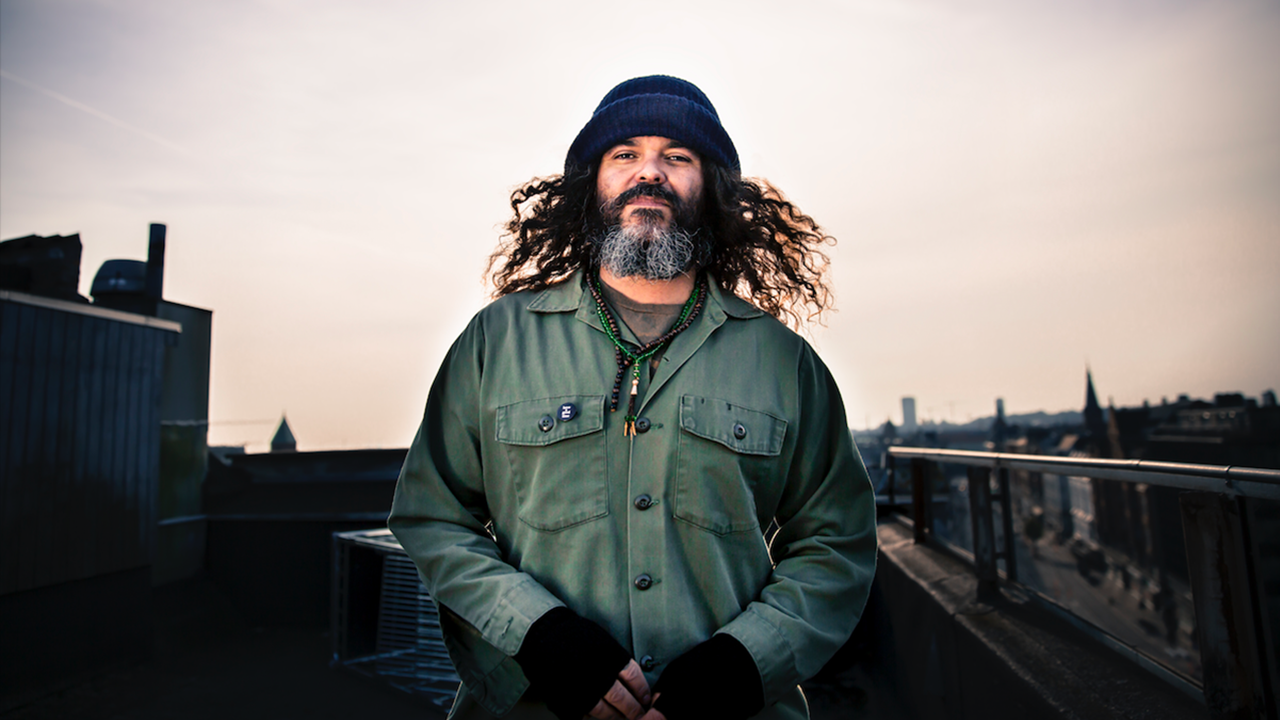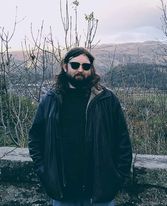Brant Bjork is the godfather of stoner rock. As the drummer and one of the chief creative forces in Kyuss, he helped put desert rock on the map in the early 90s. Even after his departure from the band – following 1994’s seminal Welcome To Sky Valley – he continued to popularise stoner rock via his work in Fu Manchu, Fatso Jetson and Mondo Generator, as well as a solo career that launched with 1999’s Jalamanta.
This century, he’s remained a prolific creative force. Between the short-lived Kyuss reunion (sans guitarist Josh Homme) under the name Vista Chino, side-projects Ché and Stöner and a whopping 16 solo albums to date, Brant continues to shape the stoner metal pantheon. Hammer cornered him to find out what gems of wisdom he’s picked up along the way.
MUSIC TRANSCENDS GENERATIONS
“I wasn’t raised by my blood parents; the folks who raised me were older than my peers’ parents by about 10 years. They were in high school when rock’n’roll first came around, so I grew up with a lot of their music – Little Richard, Buddy Holly, Fats Domino… That was probably the first music that got my blood boiling.”
HARD LIVING BREEDS HARD PEOPLE
“When I got older and met my real mom, she was the most powerful woman I ever met in my life. She was a heavy, heavy woman, very radical. She’d lived on the streets and ran with the Hells Angels. She’d lived a very difficult life but she was so strong, you know? She could make anybody laugh and was very, very cool.”
NOT ALL EDUCATION HAPPENS IN SCHOOL
“There were a lot of kids in my neighbourhood – all boys – and one in particular, Adam, was basically my mentor. He was obsessed with Peter Criss and when Kiss fell out of vogue, he discovered punk rock. He became the drummer of a punk trio called The Swankers who used to rehearse in his parents’ house. Watching him rehearse was my first experience with live music – not just live, but right in my face!”
PUNK IS ABOUT EXPRESSION
“As much as I love my roots in hardcore and punk rock, I was equally as fascinated by Jimi Hendrix and the Grateful Dead! That’s what I refer to when I say ‘Low Desert Punk’. The punk rockers in the desert didn’t have the Wattie [Buchan, Exploited vocalist] mohawks; we loved that stuff, but we dug the Dead too. The desert scene almost reminds me more of Hawkwind, Pink Fairies and stuff like that. I was always the hippie in Kyuss though, philosophically.”
KNOW WHAT YOU’RE TAKING
“For all my interest in psychedelia and 60s music, I didn’t have friends who had connections to get drugs except pot. But even if I had got the connections to score acid back then, I would have been hesitant to take it. By the 80s acid had become a street drug, cut with bad shit. I was eventually turned onto Mexican dirt weed.
As I got older and more mature, I started finding good connections for stuff – a friend’s mom who had connections with the Grateful Dead and could score good acid, someone in the high desert who got really good mescaline… mind-altering substances that made me more comfortable to experiment. But as a kid I played my cards right, because chances are the trip wouldn’t be good.”
ONE PERSON CAN START A SCENE
“We were kind of a satellite to the LA [punk] scene. Myke Bates in particular is said to be the guy. He owned a skateboarding shop in Palm Springs called Bates Skates that the kids all hung out at, and he was the guy who’d go and see Black Flag play or whatever. He’d been doing that stuff since, like, ’78 and it just trickles down. Kids would hear about bands from him and go to LA to see them play; they’d then bring records back to the desert and make tapes to pass around their friends and new bands would form. That’s how the desert scene began and evolved.”
IF YOU CAN’T FIND A SPACE, BUILD ONE
“The generator parties were just an extension of these kids stuck out in the desert creating their own events so there’d be something to do. You’d drag out a generator, bands would play, and people would park their cars and hang out. Some nights people would dance, some nights people would fight. It could be cool, a mess or anything in between. It was like [legendary 60s counterculture festival] Altamont every weekend.
Not everybody was on the same page and it could get pretty hairy. You might get someone who wasn’t a local show up who was associated with a gang or whatever, then there’d be posturing and weapons. Once those elements came into it, it was a straight bummer.”
IT TAKES A WHILE FOR FLOWERS TO BLOOM IN THE DESERT
“It’s funny, when Kyuss kind blew up, there was this big phenomenon about, ‘Oh, this rock band from the desert who played generator parties’, but we were third generation, absolutely nothing new to the kids in the desert! People thought we were the beginning because they discovered about it from us, but it was like, ‘No, that’s just your beginning’.”
SOMETIMES YOU HAVE TO LEARN ON THE JOB
“[Kyuss’ 1991 debut album] Wretch has terrible production, because we were kids and didn’t really know how to operate the studio. The studio we used was a jingle studio, so the guys working there didn’t know anything about how to record a rock’n’roll band either. But it’s an authentic turd; it captures us when we were young and full of piss and vinegar.”
KNOW WHEN TO JUMP SHIP
“Supporting Metallica [in 1993] was fucking bananas. It was weird; by the time our management told us about the offer, I’d already decided I didn’t want to be in Kyuss anymore. I felt like I was no longer jiving with the guys and whatever we’d had that was magical, it was gone. I didn’t want to stick around to watch this really magical ship sink into the sea.”
BE YOURSELF
“Our guy at the label would always say, ‘You guys will be the next Metallica’, and that bummed me out. I wanted to be this Kyuss! I felt like we fucking rocked and had hit the peak of our chemistry at the time, and Metallica were super-cool guys and really supportive, but seeing it all on that scale, it was just like, ‘This isn’t for me.’
If that’s the epitome of success in a rock band, it just seemed unrewarding. They got up and played the same things every night, said the same things… I could tell it’d become a travelling circus, a machine. I was still 20 years old, more attracted to what we were doing in terms of improvising onstage and being loose. I wanted Kyuss to go more in that direction.”
SOMETIMES YOU DRIFT APART
“Josh [Homme] and I were childhood friends and had a special bond. That was literally what broke up [when I left Kyuss] – our friendship, our brotherhood. We did it the best we could for how young we were, and tried to be mature about it, but there was a lot that went unsaid. Kyuss had taken us from boys to men, and we grew apart philosophically, musically and literally.”
YOU NEVER KNOW HOW THINGS WILL TURN OUT
“When I left Kyuss, we didn’t have a following. I didn’t realise the intrigue was growing [after the band split]. Around 2010, my solo band and [Kyuss vocalist] John Garcia were both playing Roadburn, and I was really curious to watch his band because he was doing Kyuss songs. The place was packed and people went bananas.
A week later, John called me and said he wanted to tour the project in Europe – would my solo band want to support? It was great, and every night he’d call me onstage to play Green Machine. The last show was at Hellfest in France and Nick [Oliveri, early Kyuss guitarist] was there too with his band, Mondo Generator. So John invites him to do Green Machine too and the place went berserk. A week later I’m home in LA and John’s on the phone like, ‘Are we doing this shit or not?’”
JUST BECAUSE THERE ISN’T A PLAN, DOESN’T MEAN THINGS WON’T WORK OUT
“We put the band back together and it was an amazing experience. We discovered there truly was an amazing fanbase all around the world that loves Kyuss. But as people know, we got hit with a lawsuit because Josh wasn’t stoked with the success of it.
The result of that kibosh was us creating Vista Chino and making the record [2013’s Peace], which was our exclamation point to that whole adventure. It was a sad experience, but glad for us to be able to still serve those fans with something. There’s no plans for the future as of right now, but you never know. We had no plans to get Kyuss back together either.”
Once Upon A Time In The Desert is out now via Duna Records. Brant Bjork's UK tour starts in Milton Keynes on January 24.


